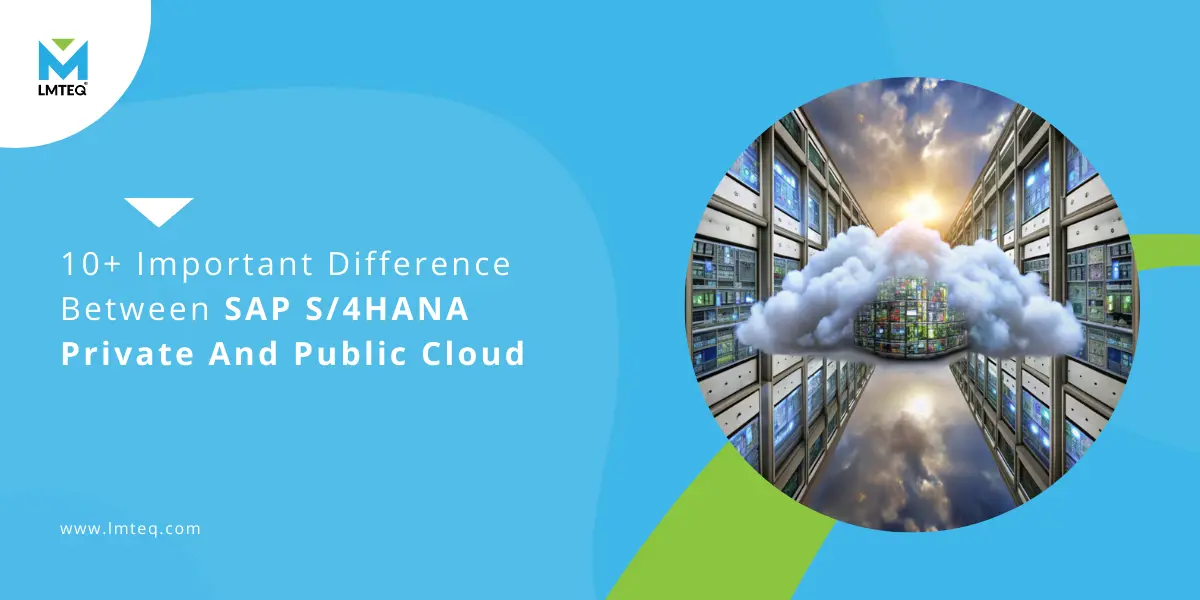In December 2020, SAP announced it would end support for the SAP ECC by 2027. There will be no further extensions this time, according to SAP CEO Christian Klein. This change will have a significant impact, particularly for organizations still using the SAP Business Suite 7.
According to various Gartner reports, over 50% of SAP ECC customers have yet to migrate to SAP S/4HANA. If your organization is among them, it’s crucial to start planning your migration now. SAP experts estimate that it will take around 2-3 years to complete the migration to SAP S/4HANA.
As you plan the migration, it’s important to consider various factors that can significantly impact your business. One key consideration is choosing between the SAP S/4HANA private cloud and SAP public cloud.
What is SAP S/4HANA Public Cloud Edition?
SAP Public Cloud is a cloud-based deployment model offered by SAP that utilizes a “multi-tenant architecture,” where multiple customers share the same software instance and infrastructure while keeping their data secure and isolated.
It is designed to provide standardized processes, rapid implementation, and automatic updates, making it a cost-effective solution for businesses looking to adopt enterprise resource planning (ERP) solutions quickly.
It offers a subscription-based pricing model and includes pre-configured best practices tailored for specific industries. It is managed entirely by SAP, covering infrastructure, security, and maintenance, allowing companies to focus on their core business operations without the need for extensive IT overhead.
Key characteristics include quarterly updates managed by SAP, limited customization options, and a lower total cost of ownership (TCO) compared to traditional on-premise or private cloud solutions.
SAP Public Cloud is ideal for small to medium-sized businesses (SMBs) or organizations that seek a scalable, flexible, and efficient ERP system with minimal complexity.
Not every SAP S/4HANA is SaaS. For example, SAP HANA Cloud is DBaaS, whereas SAP S/4HANA Cloud is SaaS.
What is SAP S/4HANA Private Cloud Edition?
SAP S/4HANA private cloud is a cloud-based deployment model from SAP. Instead of the multi-tenant architecture, the S/4HANA private cloud, as the name suggests, provides a dedicated, single-tenant ERP environment.
It offers extensive customization and integration capabilities similar to on-premise deployments while leveraging cloud infrastructure managed by SAP.
Comparison Between the SAP S/4HANA Public and Private Cloud Edition
| Features | SAP S/4HANA Public Edition | SAP S/4HANA Private Edition |
|---|---|---|
| Deployment Model | Multi-tenant, shared environment with standard configurations. | Single-tenant, dedicated environment with full control over infrastructure. |
| Deployment Speed | Faster due to pre-configured processes and standardized setup | Slower due to custom configurations and integration requirements |
| Infrastructure Control | No access to underlying infrastructure layers | Greater control over VMs, network, and storage |
| Customization Capabilities | Limited to standard configurations and minor in-app extensibility | Extensive customizations (ABAP code, custom modules, UI changes) |
| Integration Capabilities | Pre-defined SAP integration scenarios and third parties. | Supports complex SAP and non-SAP integrations. |
| Update and Upgrade Management | Quarterly automatic updates managed by SAP | Flexible, customer-controlled upgrades |
| Data Model Modification | Limited to creating custom fields via in-app tools. Standard table modifications are not supported, which can limit data structuring for specific business processes. | Full flexibility to modify SAP standard tables and data models, create custom fields, and even modify data structures. |
| DevOps Pipeline | Follows SAP’s standard DevOps and continuous integration (CI) tools. Custom deployment pipelines are not allowed, and changes are restricted to configuration-based deployments. | Custom DevOps pipelines can be set up, enabling custom code deployments, testing environments, and dedicated QA processes. |
| Analytics and Reporting | Integration with SAP Analytics Cloud is supported, but customization is limited to in-app reports. Advanced reporting using custom code or data extraction is not possible. | Allows integration with SAP BW, SAP Analytics Cloud, and third-party analytics tools. Full access to customized reports using CDS Views, ABAP, and other data extraction tools. |
| Performance | Performance may vary due to shared infrastructure | Consistent performance with dedicated resources |
| Scalability | Automatic scalability but can be impacted by multi-tenant load | Scalable but may require manual provisioning and approval |
| Security and Compliance | Standard security policies, limited configuration options | Enhanced security controls support advanced compliance needs |
| Licensing and Cost | Lower cost with standardized pricing and shared resources | Higher cost due to dedicated resources and flexibility |
| Extensibility | Limited extensibility, focus on “keep the core clean” principle | Deep extensibility with custom development and integrations |
| Industry-Specific Requirements | Best for standardized industries like retail, services, public sector | Suitable for complex industries like manufacturing, automotive |
| Pain Points | Limited flexibility, compatibility with enforced updates | Complexity, higher TCO, longer deployment time |
| Target Audience | Small-to-medium businesses prefer rapid deployment | Large enterprises needing complex ERP landscapes |
Use Cases
Manufacturing Company with Complex Production Processes
- Scenario – A large manufacturing company has highly customized production processes, complex supply chain management requirements, and integration needs with existing on-premise systems.
- Solution – SAP S/4HANA Private Cloud Edition
- Reasoning – The private cloud environment allows for deep customizations, complex workflows, and direct integration with existing SAP and non-SAP systems. The company can modify data models and business logic to align with unique production requirements. Additionally, the organization can control its upgrade timelines to ensure minimal disruption to operations.
- Business Value – Enhanced operational efficiency, improved supply chain integration, and support for complex production workflows.
Financial Services Firm Requiring High Data Security and Compliance
- Scenario – A financial services firm needs to adhere to strict data security and compliance regulations, such as GDPR, SOX, and PCI-DSS. It also wants to maintain full control over data residency and sovereignty.
- Solution – SAP S/4HANA Private Cloud Edition
- Reasoning – The private cloud edition offers isolated infrastructure, enabling the firm to control network security configurations, data residency, and compliance settings. It supports stringent regulatory compliance needs and ensures data governance is tightly managed.
- Business Value – Stronger regulatory compliance, data protection, and security. Enhanced risk management and control over sensitive financial data.
Mid-Sized Enterprise Seeking Quick ERP Transformation
- Scenario – A mid-sized enterprise wants to adopt a modern ERP system but has standard business processes. The company prefers rapid deployment and cost-effective scaling.
- Solution – SAP S/4HANA Public Cloud Edition
- Reasoning – The public cloud edition provides predefined best practices, rapid deployment, and standardized business processes. The firm can quickly get started with minimal upfront costs, and automatic quarterly updates ensure they’re always on the latest version.
- Business Value – Lower TCO, faster time-to-value, and reduced implementation complexity. Scalability to accommodate business growth without additional infrastructure investments.
Retail Company Expanding to New Markets with High Scalability Needs
- Scenario – A global retail company is expanding to new markets and needs a scalable ERP solution that can support rapid business growth, seasonal fluctuations, and new store openings.
- Solution – SAP S/4HANA Public Cloud Edition
- Reasoning – The public cloud edition’s scalability allows the retail company to accommodate increased workloads and new market requirements without complex infrastructure setups. The multi-tenant environment provides built-in agility and flexibility to support fluctuating demand.
- Business Value – Seamless scalability, efficient resource allocation, and standardized processes. Supports global expansion with rapid deployment of new locations and functionalities.
Key Takeaway
Three years is a short time for a full-scale SAP ECC migration to the SAP S/4HANA cloud regardless of the edition. It is imperative to find an authentic, best-in-the-industry SAP Implementation partner to carry out your SAP S/4HANA migration.
As an official SAP partner, we help you migrate from your SAP Business Suite 7 to the S/4HANA platform strategically and swiftly. Our SAP-certified professionals collaborate with your IT and Ops team to understand the business requirements and help to choose the best SAP S/4HANA solution for your business and even assist in customizing the platform if necessary.
In terms of features and functionality, SAP S/4HANA private cloud seems to be superior, but in actuality, both SAP S/4HANA private and public edition caters to different target audiences and business requirements.
To understand more about the SAP S/4HANA migration, check out our Roadmap to S/4HANA and Readiness Check for S/4HANA.
Frequently Asked Questions
1. Which edition should my organization choose if we require extensive customizations and integrations?
If your organization requires extensive customizations, complex integrations, or unique business processes, the SAP S/4HANA Private Cloud Edition is the better choice. It allows you to modify SAP’s core functionalities, supports custom ABAP development, and provides flexibility to integrate with both SAP and non-SAP systems seamlessly.
2. Can we customize SAP S/4HANA in the Public Cloud?
Yes, but the customization is limited in the Public Cloud, focusing on best practices and standard functionalities.
3. What’s the upgrade cycle like for each edition?
SAP S/4HANA Public Cloud has automatic quarterly updates, while the SAP S/4HANA Private Cloud allows for flexible, customer-driven upgrades.
4. Which edition is more cost-effective for mid-sized businesses?
The Public Cloud Edition offers a lower TCO and faster deployment, making it suitable for mid-sized organizations.

